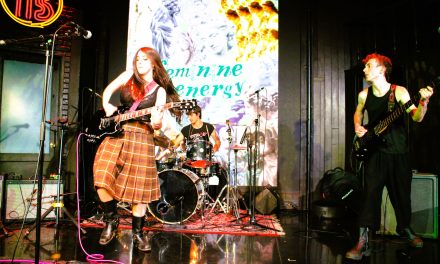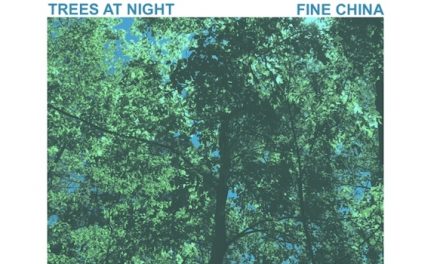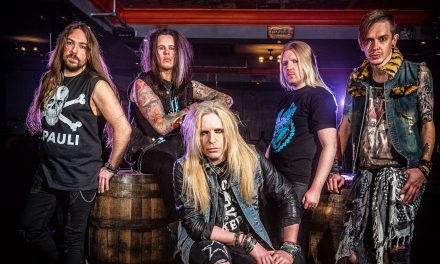
The Beating Heart of Progressive Rock: An Interview with White Willow

photo by Dagfinn Hobæk
The Beating Heart of Progressive Rock: An Interview with White Willow
Whether you’re a Prog fan or seeking out new, challenging, brainy and emotional music, White Willow is a definite catch. Led by multi-instrumentalist Jacob Holm-Lupo, White Willow will release their seventh album Future Hopes this spring on Laser’s Edge. Filled with violins, clarinet, flute and players from the best of European rock, jazz and more, Holm-Lupo has crafted seven songs that grab you by the heartstrings as well as get your head banging with crystalline vocals, classic synthesizers, chiming and textured electric and acoustic guitars and a rhythm section that can add funk and jazz then rock out, often in the same song
Hello Jacob, this is Bret Miller from Highwire Daze, in the past my editor Ken has interviewed you. I’m loving your new album, it gives me chills!
Thanks, man – we really appreciate hearing that! And yes, I remember Ken interviewed me. I actually read Highwire Daze a lot to find new stuff to listen to.
For Future Hopes did you have a theme or something you wanted to try out that you haven’t before?
For Future Hopes I had a few things I wanted to try out, yeah. One was to really let the textures of analog polyphonic synths dominate. I had gone in that direction on the previous album, Terminal Twilight, but on this one I really wanted to go a little bit over the top, so there’s lots of CS80, Prophet 5, Polysix and Oberheim on there. I wanted a kind of glittering yet slightly unsettling texture to the songs, that sci-fi feel. The other thing was that I envisioned a loose story, two people finding each other and holding on to each other and looking for a safe haven in a world where everything else is falling apart. To me the songs tell a story about what’s important in life. Things can collapse, and the veneer of society can fall away, but the human bond, love, and a sense of home and belonging is something we carry inside of us regardless of circumstances. So I wanted the album both to convey the sense of danger and estrangement of that world, as well as the warmth and closeness of the relationship. I don’t know if I succeeded but that was the idea.
Venke Knutson is just the whole package. I saw some of her videos and she’s so full of personality. Her voice just goes from filling me with joy to breaking my heart. What was it about her that made you think she’d be a good fit in White Willow? How has Venke and the past vocalists made White Willow what it is?
Yeah, she is amazing. I was always a fan of her pop songs, since I’ve always loved a good pop tune, and her voice obviously is something that springs out at you from the radio. But it was when I happened to pass where she was giving a free, open-air concert that I heard her, live and unadorned, that I realized, “wow, she can REALLY sing!”. So I got her contact information and I got in touch. She was in a busy period of her life with little kids and stuff, but a while later she got back in touch, she’d listened to the music and dug it and wanted to work with me. The rest is history. Not only is she a fantastic singer, but a wonderful person to work with, cheerful, easy-going and 100% professional.
Each singer we’ve had has put a stamp on the band. Sylvia Skjellestad has sung on the most records, and her voice has really defined the band’s sound to a large degree. She has a very passionate voice, very expressive, and it really cuts through the mix. Venke has a different style, more laid back, with a sort of icy, cool sheen to her timbre. For this album that was exactly what I needed, so it was a match made in heaven. What Venke has brought in addition to her actual voice, is a different approach to vocal arrangements. A lot of the harmonies are her work, and she’s also made adjustments to the melodies that really added to the impact of the songs.

Hah, yeah, I guess it’s all in me. I like both things. Two of my absolute favorite bands/artists are Nick Drake and Blue Öyster Cult. I grew up with metal and hard rock, then I found folk rock and prog rock, so there’s both those sides. And when White Willow started out the black metal scene was at its most intense in Norway, and I was really into that music. You gotta have a bit of both. As for the other musicians they really have a similar background. Especially our keyboard player Lars (Fredrik Frøislie), who also drums and plays keyboards in black metal bands and has his own extreme metal project, In Lingua Mortua. I don’t think Venke had that much experience with heavier music, in fact she was a little shocked when I suggested we do a Scorpions cover. But now she loves it!
You work with some amazing musicians. Is there something you heard of theirs that made you think they’d be a perfect fit for White Willow?
Well, I already mentioned that I saw Venke in concert. Ellen (Andrea Wang), our bass player, was someone I stumbled across back in the Myspace days. She was playing with a jazz-rock group called SynKoke, and the bass really grabbed me – she was playing with so much energy and precision, and while it was obvious that she had all the chops in the world she didn’t over-complicate things, even though the music was complex. I appreciate that kind of attitude. I think she is hands down Norway’s best bass player right now. People should check out both her solo work and her work in Pixel, an indie-jazz quartet. Hedvig (Mollestad), our guest guitarist on the album, has taken instrumental rock/jazz to a whole new level with her Hedvig Mollestad Trio, and I just love her playing and her music to bits. For the album I needed a guitar player who could both navigate tricky harmonic progressions and a lot of time changes while at the same time retaining a rock edge, and she was that. She does a perfect job, I think. Lars, Ketil (Einarsen, flautist) and Mattias (Olsson, drummer), we all go way back as part of the old Scandinavian “prog mafia”. Ketil has been with the band since 1998, Mattias first played on our second album and then came back for Terminal Twilight and this one, and Lars has been our keyboard player since 2001. Mattias was in the Swedish prog giants Änglagård at the time White Willow started, and he has always been my drum idol.

I don’t really think in those terms, although that would probably work too. But I tend to approach it a bit more organically. You start somewhere, maybe with a verse melody or some good progression. I think for this song I actually started at the very beginning: The long, intro synth section. That was a bit inspired by Eddie Jobson, the keyboard player in U.K. who has always been an inspiration to me. Then I guess the vocal sections grew out of that and things just sort of accumulated. It’s kind of funny because as I was writing the intro part I shared a bit of it in social media, and a fan said “wow, I guess after that you’re going to have some section with crazy drumming from Mattias”. So I thought, what the hell, let’s do that. And that became the frantic section after the first vocal sections. So I guess you can call that interactive composing! I’m glad you like the tune. It’s always a bit of a gamble to make such long pieces, you don’t know if you’ll be able to hold the listener’s attention throughout the whole thing and you don’t know if the whole thing will be coherent. But there are a few tricks to the process, like returning to previous musical parts but maybe arranged in a new way and stuff like that. The guitar solo at the end runs over the same chords as the intro for example.
The closing song sounded really familiar to me. I knew right away it was the Scorpions but you’d done your thing to the song, making it harder to pin down. But I eventually got it. I love the clarinet part too. What led to your decision to cover this song? What other songs would you like to cover in the future?
Well, first of all I love that song. I am a huge Scorpions fan, and that’s one of their best – it has that Middle Eastern flavour and the doomy tempo and all. My idea was that since they’re a German band I would bring in some other Kraut-y element, and that ended up being a sort of Tangerine Dream-like synth pulse replacing that staccato guitar that runs through the original. Then I thought the perfect thing to offset the sort of machine-like Teutonic feel of all that would be something very organic and human-sounding. David Krakauer is probably the best klezmer clarinetist in the world, and klezmer clarinet is probably the closest thing an instrument comes to expressing human emotions through a human-like sound. It’s a sound filled with passion and suffering. So I thought, perfect, let’s ask him. And he loved the idea. The icing on the cake is Venke’s voice that floats like a feather above the whole chaos.
Do you have plans on taking these songs on tour or a festival or two? Who have you toured with in the past and who would you like to tour with or collaborate with in the future?
That’s a bit of a tricky issue. White Willow hasn’t toured in 10 years. We used to do the circuit of prog festivals and prog venues both in the US and in Europe, but the brutal fact of the matter is that I honestly hate playing live, and especially after I became a dad and life became a bit more hectic I’m really happy to just chill in my studio and make music there, rather than haul around the planet and sleep in bad motel rooms. So I guess the answer is no, even though I have loved getting out there and connecting with the fans. We’ll see what happens.
I read that In Dim Days was influenced by science fiction novelists. Who are some of your favorite story tellers? What types of tales resonate with you? Will you be seeing the new Blade Runner opening night like I will?
I will absolutely be seeing the new one! Blade Runner is the best movie ever made. And yes, I think without science fiction books to inspire me I might not have made so much music. Authors like J.G. Ballard, Philip K. Dick, William Gibson, Samuel R. Delany and Michael Moorcock all provide great inspiration for me. I read their best books and music just starts in my head. Science fiction is very visual and cinematic, and it stimulates the imagination. And of course prog and sci-fi go well together. The kinds of stories I like are often the atmospheric ones. The space opera thing is not so much my thing, it’s more about, what’s that world really like, how do the people living in it feel about it, what does it look like, feel like, smell like – I want to be there and be inside people’s heads. Authors like William Gibson and J.G. Ballard are really good at that.
A keyboard that Vangelis played on the score for the original Blade Runner was used prominently on Future Hopes. There has been many synth artists coming out in recent years who take their inspiration from the genre movies of the 80’s and their accompanying scores and soundtracks. Is Future Hopes inspired by any particular story or movie? Maybe one that you created?
I think it’s interesting that there’s a bit of a zeitgeist for that right now. Composers like John Carpenter and Vangelis have really come back into focus, because I think a lot of people who grew up in the 80s with memories of those movies and those soundtracks are now the tastemakers in modern culture. We’ve just come to that point in the cultural cycle where that stuff is appreciated again. I think those sounds, like a fat, modulated, suspended chord on an old-fashioned polysynth or a propulsive, Tangerine Dream-like sequencer, it brings back good feelings for a lot of people, it reminds them of careless times and smashing good movies and records. For Future Hopes there were a few things that went into the melting pot of inspiration – obviously Blade Runner, both the movie and the soundtrack, and also a story by Robert Silverberg, Nightwings, where not so much the plot but the atmosphere of the story really inspired me to write music.
And how does The Opium Cartel differ from White Willow? How is it the same? Will you be making another Cartel album? The songs on Ardor are certainly different from most everything else I have heard in my life.
The similarities are probably my obsessions with certain synth sounds and some of the same harmonic language I use in White Willow. But where White Willow is a prog project with a lot of long tunes and instrumental sections, I have tried to strip the songs in The Opium Cartel down, and focus on melodies and a simpler backbone to the music. There’s a lot of influences from 80’s art pop like The Blue Nile or Prefab Sprout, and also a bit of AOR, I know some people thought they heard some Asia in there, and that might be right … And yes, there will be a new album. That’s actually my next project now.
I read in an interview you did with editor Ken for The Opium Cartel that you based a song off of Michael Moorcock’s Elric, aka “The White Wolf”. I’ve read all those books and the original comics that came out when I was 13 were amazing. What is it about the author and Elric that drew you to him? Have you read any of the other Eternal Champion books like Corum? And I’m sure you know Moorcock wrote a song or two for Hawkwind.
Oh yeah, I love Moorcock. I was completely obsessed with him in my teens and I still read him with great pleasure. I think I’ve read almost all of his books, and that’s saying something, since he’s almost as productive as Stephen King! I find Elric interesting as a character because he is so much of an anti-hero. He might be an Eternal Champion and he might have a sword that makes him almost invincible and immortal, but he’s such a sad, tragic, figure, really. Always lonely, always far from home, and always on some futile, semi-doomed mission, a victim of fate and circumstance. So obviously, you just have to write some songs about him! I love what Moorcock did with Hawkwind, and I also love the stuff he did with Blue Öyster Cult. Black Blade is a fantastic tune, and also Veteran of the Psychic Wars.
What efforts have you made over the years to sound current yet include recognizeable and human-played instrumentation? So much music is over-produced, repetitive, made in a box sounding, all the life and soul sucked out of it. Yours sounds like a vital and breathing organism.
We’ve always wanted White Willow to sound organic. Throughout the years we’ve used flutes, violins, cellos, oboes, on this album the clarinet. I think the mixture of electronic and acoustic instruments is really interesting and satisfying, and I also like mixing actual band playing with some programmed elements. To me the human element, whether it’s a real good drum groove or a beautiful voice or an expressive flute, is the breath and the soul of the music, whereas electronic elements can add a sort of architectural and grandiose element to the proceedings, something a bit larger than life. I like the combination of the two.
Thanks for your time, Jacob. I hope you can play Los Angeles.
It would be cool. We played there, a long, long time ago, actually. Thanks for a great interview, Bret!
(Interviewby Bret Miller)
LINKS:
Facebook
Laser’s Edge
Bandcamp
Website

















